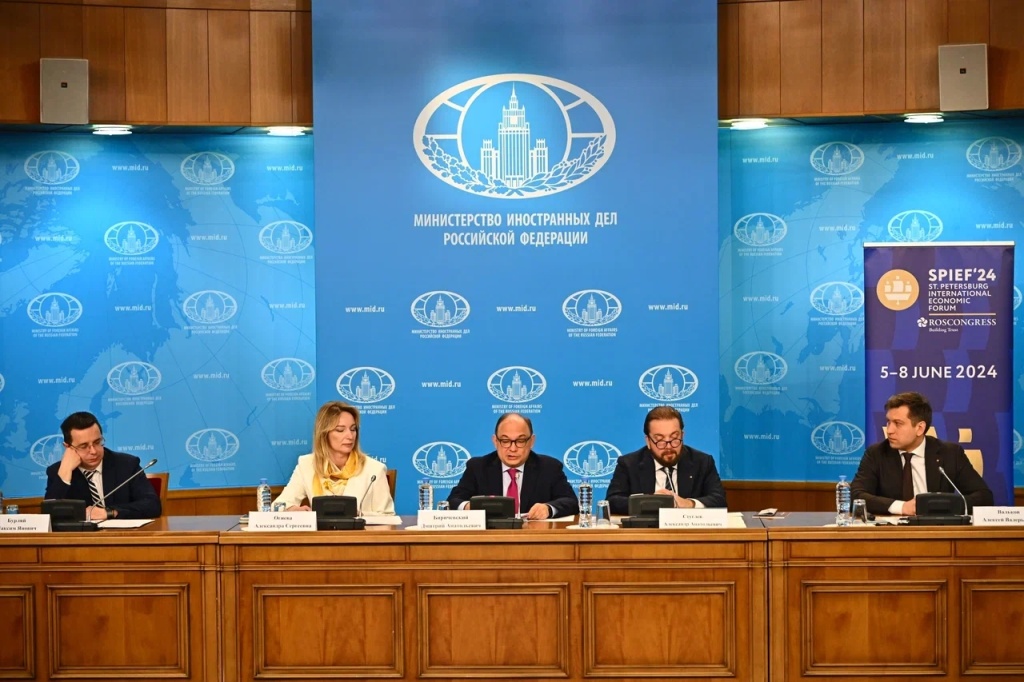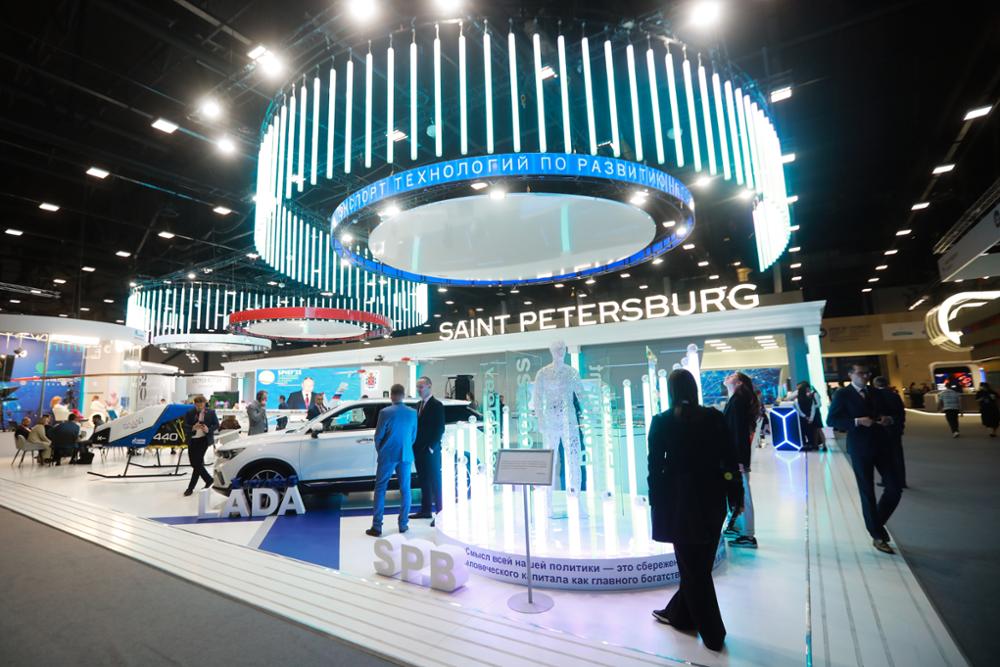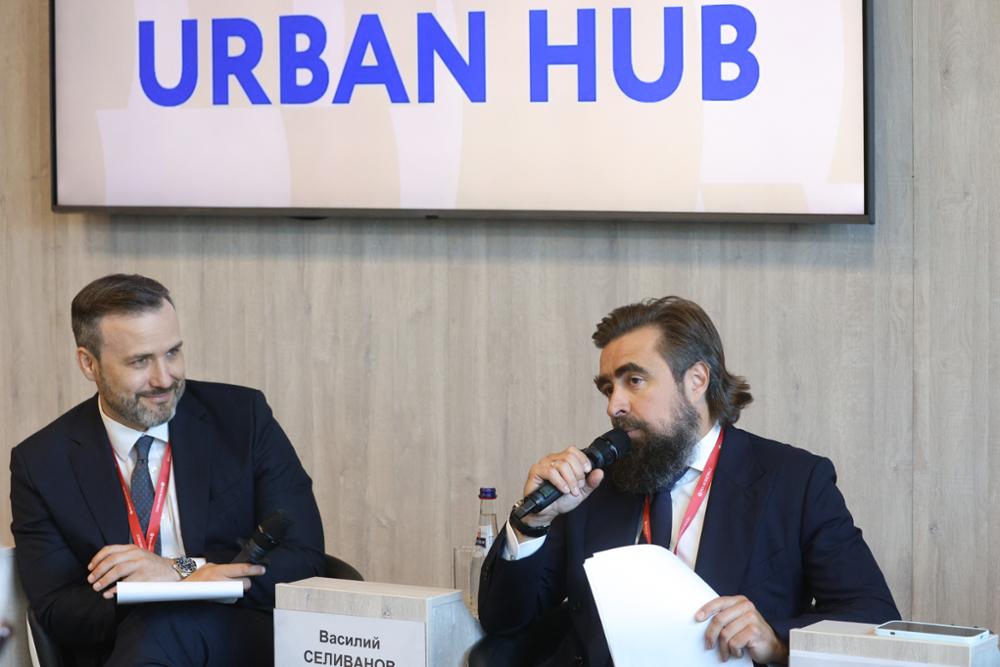
Outcomes of the 20th St. Petersburg International Economic Forum 2016: Capitalizing on the New Global Economic Reality
On June 16–18, the 20th St. Petersburg International Economic Forum was held, bringing together more than 12,000 participants from 133 countries, including media representatives and accompanying persons.
On June 16, Deputy Prime Minister of Russia, Chief of Staff of the Presidential Executive Office, and Chairman of the SPIEF Organizing Committee Sergei Prikhodko gave a welcome address at the official opening of the Forum.
Heads of states, government officials, and executives from leading international companies and organizations gathered in St. Petersburg for the largest business event of the year.
Advisor to the President of the Russian Federation and Deputy Chairman and Executive Secretary of the SPIEF Organizing Committee Anton Kobyakov highlighted the Forum’s significance. “The Forum’s most important outcome is that it has once again confirmed its reputation as one of the largest, most respected, and desperately needed platforms in the world for direct and open discussion between representatives of the state, the business community, academia, and the expert circles from around the world of the current challenges facing the global economy and financial sector. The number of Forum participants continues to grow year after year: another testament to Russia’s enduring role as a crucial global business and finance hub. We highly value the interest and, more importantly, the trust of Forum partners, guests, and participants.”
1. Forum events
The SPIEF programme was unrivalled in terms of scale and the number of themes covered, featuring more than 300 events.
The official business programme comprised over 100 events, including:
· the Opening Ceremony, attended by UN Secretary-General Ban Ki-moon, President of the European Commission Jean-Claude Juncker, and President of Guinea Alpha Condé
· the Plenary Session: Capitalizing on the New Global Economic Reality, attended by President of the Russian Federation Vladimir Putin, President of Kazakhstan Nursultan Nazarbayev, and Prime Minister of Italy Matteo Renzi
· A meeting between President of Kazakhstan Nursultan Nazarbayev and members of Russia’s business community
· the B20 Regional Consultation Forum
· the SCO Business Forum
· the BRICS Business Forum
· a session of the Valdai International Discussion Club
· the Global Energy Prize Award Ceremony
· the Development Prize Award Ceremony
· a presentation on the outcomes of the Russian Regional Investment Climate Index
· Energy Company Summit: World Oil Market at Crossroads: Uncertainty Investments or Risk Management?
· Media Summit
· a meeting with prominent academics and Nobel Prize winners
· 4 business breakfasts
· Sberbank Plenary Session
· 55 panel sessions as part of the main programme
· 5 TV debates
· 10 business dialogues
· 9 roundtables
· 4 events in the Conversations with the Extraordinary series, featuring former French President (2007–2012) Nicolas Sarkozy; CEO of Hyperloop Transportation Technologies Dirk Ahlborn; Executive Chairman of Alibaba Group Jack Ma; and Founder, Chairman, and CEO of LeEco Global Holdings LTD Yueting Jia
2. Forum business programme
The Forum’s key event was the plenary session ‘Capitalizing on the New Global Economic Reality’, covered by 86 international television channels, including the Forum’s media partners: CNBC, Bloomberg, CCTV, and CNN.
Discussions hosted by the Forum were built around five programme pillars:
• Sustaining Economic Expansion
• Realizing the Economic Potential of Russia
• New Geo-Economic Dynamics
• Navigating Revolutions in Technology
• The Human Dimension
The SPIEF 2016 programme was designed to reflect the latest trends in global economic development based on input from more than 200 leading economy and finance experts, global business leaders, representatives of professional business associations, government officials, and academics from Russia, Europe, the United States, Asia, and Australia. An expert group took part in all Forum events and will produce a set of recommendations based on the outcomes of the discussions held as part of the business programme.
More than 600 speakers and moderators participated in discussions and debates at the Forum.
Pillar One, SUSTAINING ECONOMIC EXPANSION included 21 events.
Pillar Two, REALIZING THE ECONOMIC POTENTIAL OF RUSSIA, consisted of 24 events, including five roundtables and 19 panel sessions.
Pillar Three, NEW GEO-ECONOMIC DYNAMICS, featured six events, including two TV debates.
Pillar Four, NAVIGATING REVOLUTIONS IN TECHNOLOGY, consisted of 10 panel sessions held on day one of the Forum.
Pillar Five, THE HUMAN DIMENSION, included nine panel sessions.
3. Events held on the margins of SPIEF 2016
The following events were held on the margins of SPIEF 2016:
1. The second Russian Small and Medium-Sized Enterprises Forum: Small Business – Big Opportunities. The aim of the Forum was to explore the future development of small and medium-sized business as the foundation of Russia’s economy.
2. The inaugural Interregional Forum on Strengthening International Alliances of Small and Medium-sized Enterprises in Russia and Latin America and the Caribbean (LAC), under the auspices of the United Nations Industrial Development Organization (UNIDO).
3. The first Conference on the Economic Development of the Arctic. The Conference included four panel sessions focused on effective management of the Arctic, tools for tapping the economic and scientific potential of the Arctic regions, transport infrastructure designed to link the Arctic to the Northern Sea Route, and the region’s cultural and tourism potential.
4. Several intergovernmental commissions convened at the Forum to discuss international economic, scientific, and technological cooperation. These included:
- a meeting of Co-Chairs of the Russian-Palestinian Intergovernmental Commission on Trade and Economic Cooperation
- a meeting of Co-Chairs of the Russian-Afghan Intergovernmental Commission on Trade and Economic Cooperation
- a meeting of Co-Chairs of the Russian-Congolese Intergovernmental Mixed Commission on Trade and Economic, Scientific, and Technical Cooperation
5. Several leading consulting companies presented examples of their reports at the Forum.
6. The opening day of SPIEF 2016 included the ceremonial franking of a postage stamp issued to commemorate the twentieth anniversary of this major economic and business event. The ceremonial franking was performed by Chief of Staff of the Russian Presidential Executive Office Sergei Prikhodko and General Director of Russian Post Dmitry Strashnov.
7. A range of special events were also held for foreign ambassadors in the Russian Federation, officials and business leaders from Africa, Latin America, and the Asia-Pacific region, and Roscongress Foundation regional partners.
4. High-ranking participants
The Forum’s plenary sessions, roundtables, and briefings were attended by more than 40 high-ranking Russian officials, including ministers and heads of federal agencies and services, and 60 high-ranking foreign dignitaries, including: Prime Minister of Italy Matteo Renzi, President of Kazakhstan Nursultan Nazarbayev, President of Guinea Alpha Condé, Prime Minister of Malta Joseph Muscat, UN Secretary-General Ban Ki-moon, President of the European Commission Jean-Claude Juncker, Vice President of the Council of Ministers of Cuba Ricardo Cabrisas Ruíz, Vice President of Uruguay Raúl Sendic, Vice President of Ghana Kwesi Amissah-Arthur, Second Vice President of Burundi Joseph Butore, and Chairman of the Board of the Eurasian Economic Commission Tigran Sargsyan.
The Forum welcomed high-level delegations from Armenia, Burundi, Guyana, Ghana, Guinea, Italy, Kazakhstan, Luxembourg, Malta, China, Cuba, and Uruguay; 30 ministers from 22 foreign countries (Austria, Albania, Bangladesh, Bulgaria, Bolivia, Botswana, Burundi, Hungary, Venezuela, Ghana, Guinea, Egypt, India, Iran, Italy, Republic of the Congo, Lebanon, Palestine, Slovenia, Sudan, Finland, and Ecuador); the First Deputy Prime Minister of Belarus, the Deputy Prime Minister of Armenia, and 11 ministers from CIS member states (Azerbaijan, Kazakhstan, Kyrgyzstan, Turkmenistan), Abkhazia, and South Ossetia.
5. Forum participants
This year, the Forum was attended by more than 600 heads of Russian companies and approximately 300 foreign executives, including: Rainer Seele, Chairman of the Executive Board and CEO, OMV (Austria); Dennis Nally, Chairman, PricewaterhouseCoopers International (United Kingdom); Bob Dudley, Group CEO, BP (United Kingdom); Joe Kaeser, President and CEO, Siemens (Germany); Klaus Mangold, Chairman of the Supervisory Board, TUI (Germany); Olaf Koch, Chairman of the Management Board, Metro (Germany); Heinz Hermann Thiele, Proprietor and Honorary Chairman of the Supervisory Board, Knorr-Bremse (Germany); Richard Samuel Elman, Chairman of the Board and Executive Director, Noble Group Limited (Hong Kong); Cees 't Hart, President and CEO, Carlsberg (Denmark); Satish Reddy, Chairman, Dr. Reddy’s Laboratories (India); Shiv Vikram Khemka, Vice Chairman, SUN Group (India); J. Paul Rollinson, President and CEO, Kinross Gold Corporation (Canada); Jack Ma, Founder and Executive Chairman, Alibaba Group Holding Limited (China); Guo Ping, Deputy Chairman of the Board, Huawei Technologies Company (China); Yueting Jia, CEO, Leshi Internet Information & Technology Corporation (LeEco) (China); Bing Zhu Yan, Chairman of the Board, Bank of Beijing (China); Ben van Beurden, CEO, Royal Dutch Shell (Netherlands); Jeremy Weir, CEO, Trafigura Group Pte (Netherlands); Gustavo Sapoznik, CEO, ASAPP (USA); Dirk Ahlborn, CEO, Hyperloop Transportation Technologies (USA); Jim Rogers, Chairman, Beeland Interests (USA); Donald James Umpleby III, Group President for Energy & Power Systems, Caterpillar (USA); Daniel Yergin, Vice Chairman, IHS (USA); Dominic Barton, Global Managing Director, McKinsey & Company (USA); Johan Aurik, Managing Partner and Chairman of the Board, A.T. Kearney (USA); Rex Tillerson, Chairman and CEO, ExxonMobil Corporation (USA); Javier Perez, President for Europe, MasterCard (USA); Banthoon Lamsam, Chairman of the Board and CEO, KASIKORNBANK Public Company Limited (Thailand); Pekka Lundmark, President and CEO, Fortum Corporation (Finland); Jean-Pascal Tricoire, Chairman and CEO, Schneider Electric (France); Paal Kibsgaard, Chairman and CEO, Schlumberger (France); Patrick Pouyanné, Chairman of the Board and CEO, Total SA (France); Franck Riboud, Chairman of the Board, Danone (France); Erik Dieter Gerhard Koebe, Senior Country Officer, Crédit Agricole CIB (France); Ivan Glasenberg, CEO, Glencore (Switzerland); Peter Brabeck-Letmathe, Chairman, Nestlé (Switzerland); Peter Robert Voser, Chairman of the Board, ABB Ltd. (Switzerland); Frederik Paulsen, Chairman of the Board, Ferring Holding (Sweden), and others. The leaders of 74 regions of the Russian Federation also took part.
6. Media representatives
SPIEF also recorded a high level of media interest: 2,651 media representatives (2,156 from Russia and 495 from abroad) from 700 organizations (542 Russian and 158 foreign) registered for the Forum. Applications to attend were received from 47 countries (not including Russia): Austria, Azerbaijan, Armenia, Bahrain, Belarus, Belgium, Bulgaria, Bosnia and Herzegovina, Burundi, United Kingdom, Hungary, Vietnam, Ghana, Guinea, Germany, Hong Kong, Greece, Denmark, Egypt, Israel, India, Iraq, Iran, Spain, Italy, Kazakhstan, Canada, Qatar, China, Republic of the Congo, Latvia, Lebanon, Malta, Moldova, UAE, Poland, South Korea, Serbia, USA, Turkey, Uzbekistan, Finland, France, Switzerland, Sweden, Estonia, and Japan.
SPIEF was covered by more than 2,500 media representatives, including video and photo hosting providers.
7. Forum partners
This year, 61 companies partnered with the Forum, including five General Partners (Sberbank of Russia, Rosneft, Vnesheconombank, Gazprom, and VTB Bank), one Strategic Partner (Rosseti), one Telecommunications Partner (MegaFon), one Knowledge Partner (PwC), one Business Networking Platform and Presentation Area Partner (EY), the Official Airline of the Forum (Aeroflot), and Official Car of the Forum (Mercedes-Benz Russia).
Many Russian and international companies showed a keen interest in partnering with the Forum as part of its business programme.
8. SPIEF venue
This year, SPIEF was held at a new venue, the ExpoForum Convention and Exhibition Centre, which is three times larger than the previous venue at around 100,000 square metres, with 66,000 metres comprising temporary structures. The venue used to host SPIEF 2015 was approximately 43,000 square metres in area.
In addition to the traditional events on the congress part of the programme, participants at this year’s Forum had access to expanded marketing opportunities thanks to the additional exhibition space.
For the first time, the following were held at the Forum:
1. the SPIEF Investment Projects exhibition;
2. and SPIEF Business Expo, an exhibition of products and services facilitating business operations
3. Italy pavilion – Italy, SPIEF 2016’s guest country, hosted a pavilion showcasing its industrial potential, design, and culture. Previous guest countries at the Forum have included France, Spain, and the Netherlands.
4. The new venue also offered more meeting rooms, networking areas, and stands.
Forum participants were also able to make use of the following services:
• SPIEF Open Studio: operating for the first time at the event, the SPIEF Open Studio provided a venue for conversations with global business and political leaders and experts from a wide array of fields. Open Studio materials were published on the official SPIEF website and social networking accounts.
• SPIEF2016 mobile app: providing information about the Forum programme and press events, and allowing participants to send in questions for upcoming sessions, make use of the venue navigation system, watch broadcasts of sessions, exchange messages, arrange meetings, and organize their own personal Forum timetable.
• SPIEF Photobank: featuring the business and cultural programme, key speakers, official and cultural events, as well as archive photos from past forums and a retrospective of images of St. Petersburg, all available to view and download in high resolution. The service can also be accessed from mobile devices.
• SPIEF Channel: interviews with world leaders attending the Forum.
• Broadcasts of Forum sessions and video coverage from various television channels: live broadcasts of the plenary session and other key Forum events available in all SPIEF pavilions, as well as Forum television coverage produced by major Russian and foreign networks. An archive of the broadcasts is now available on the official SPIEF website.
• TASS Window: a multimedia news feed combining photographs, graphics, and concise reports on events taking place at the Forum.
• Text message notifications and other services.
9. Exhibitions
At the SPIEF Investment & Business Expo, Russian regions and businesses showcased their success stories for the Russian and international investment community at 21 different stands:
1. North Caucasus Development Corporation
2. Vladimir Region
3. Krasnodar Territory
4. Moscow Region
5. Northwest Cluster for Medical, Pharmaceutical, and Radiation Technology (Leningrad Region)
6. Nizhny Novgorod Region
7. Republic of Crimea
8. Republic of Tatarstan
9. Tula Region
10. Association of Innovative Regions of Russia
11. Belarus
12. Expo 2017 (Astana)
13. Yalta International Economic Forum Foundation
14. Russian Export Center (REC)
15. Knorr-Bremse Group
16. Lakhta Center Mixed-Use Complex
17. National Payment Card System
18. Virtual Reality
19. Assistance Fund for Housing and Municipal Service Reform
20. SuperOx
21. Heliports of Russia
Each stand hosted more than 15 multiformat events with heads of Russia’s regions and business leaders, including: Prime Minister of Crimea Sergey Aksyonov; Governor of Moscow Region Andrei Vorobyov; Governor of Leningrad Region Alexander Drozdenko; Acting Governor of Tula Region Alexei Dyumin; Governor of Krasnodar Territory Veniamin Kondratyev; President of Tatarstan Rustam Minnikhanov; Governor of Vladimir Region Svetlana Orlova; Governor of Nizhny Novgorod Region Valery Shantsev; Head of the Crimean Development Corporation Dmitry Abramov; President and Chairman of the Board of Pochta Bank Dmitry Rudenko; co-Founder and CEO, of QIWI Group Sergey Solonin; General Director of the North Caucasus Development Corporation Sergey Kharitonov; Chairman of the Management Committee and Deputy Chairman of the Board of Gazprom Alexey Miller; Sheikh Salman Bin Ibrahim Al-Khalifa of Bahrain; and Proprietor and Honorary Chairman of the Supervisory Board of Knorr-Bremse Heinz Hermann Thiele.
More than 20 agreements were signed during the stand presentations.
One part of the programme that attracted the particular interest of Forum participants was the SPIEF Presentation Area, with the support of EY and the Foreign Investment Advisory Council (FIAC), which was open 24 hours a day from June 15 to June 18. This unique platform allowed Forum exhibitors and partners to present their projects, organize discussions focused on their areas of interest, and enter into a dialogue with experts, potential investors, government officials, and media representatives.
The SPIEF Presentation Area was moderated by the TASS Russian news agency.
The area hosted the signing of important agreements and presentations of unique projects.
1. Presentations:
· Heliports of Russia: Large-Scale National Project to Develop Infrastructure for Helicopters
· The Investment Potential of Moscow Region
· Aluminium Valley: Creating a Special Economic Zone in Krasnoyarsk Territory
· BMG Driverless Buses and the Urban Driverless Bus System
· Citadel: A Unique Project
· The Investment Potential of Krasnodar Territory, the Republic of Crimea, the Republic of Tatarstan, and Tula Region
· Greece: A Four-Season Tourism Destination
· Tourism: Investing in Greece’s Classical Competitive Advantages
· Creating an Innovative Medical Cluster in the Caucasian Mineral Waters Region: the North Caucasus Development Corporation as an Instrument of State Economic Policy in the Region
· Investment Opportunities in the Republic of Belarus
· The Investment Potential of Kameshkovo Single-Industry Town
· The MIR Card: Present and Future
10. Agreements
The number of agreements signed at the SPIEF continues to grow: 102 agreements in 2013, 175 in 2014, and 205 in 2015.
This year, the Forum again saw record growth in the number of investment agreements signed.
A total of 356 official documents were signed at the Forum, including:
292 agreements
53 memoranda
6 roadmaps
2 programmes
2 contracts
1 technology transfer agreement
The total value of signed agreements not classed as confidential was RUB 1 trillion 46 million.
Over the three days of the Forum (June 16–18), 50 Russian regions signed 180 agreements. The most documents were signed by the Government of St. Petersburg (24 agreements totalling RUB 118 billion), the Government of Tula Region (17 agreements), and the Leningrad Region Administration (12 agreements totalling RUB 110 billion). These agreements are designed to boost socioeconomic development in Russia’s regions, implement major investment projects, and expand economic and cultural cooperation between the regions.
Contracts signed by Italy and Russia during the Forum are valued at USD 1.3 billion.
The agreements are designed to strengthen ties between enterprises, official bodies, and Russia’s regions in such fields as telecommunications, science and education, transport, environmental protection, export development, construction, electricity, healthcare, fuel and energy, banking and investment, regional socioeconomic development, investment projects, trade and commerce, technology, and social and cultural cooperation.
For more detailed information about the agreements signed at SPIEF 2016, please send a written request to the Roscongress Foundation by email to info@roscongress.org or media@roscongress.org.
11. Cultural and sporting events at the Forum
During SPIEF 2016, a total of 67 cultural, entertainment, and sporting events were laid on for Forum participants, including performances at the city’s theatres.
The majority of events were organized independently by SPIEF 2016 Partners and participants.
They included:
• Art-Football festival of music and football, held as part of the Under the Flag of Kindness! Russian national charity initiative
• A charity evening at the Mikhailovsky Theatre
• Charity inclusive theatre production: A Completely Unexpected Event: Marriage at the Turner Scientific Research Institute for Children’s Orthopaedics
• For the first time in its history, the Forum included a five-kilometre run, the SPIEF RACE. The route took participants past some of the city’s historical attractions, including the Winter Palace, the Church of the Saviour on Blood, and Kazan Cathedral. The first Forum participants past the finish line were Onexim Group CEO Dmitry Razumov and Evelina Levieva from Sovetsky Sport, while Dmitry Belikov of Nash Sibirsky Kharakter and Sophia Mokhova of Rosbalt were the fastest media participants. More than 700 applications to compete in the SPIEF RACE were received
• Reception on behalf of the Governor of St. Petersburg
• Concert on Palace Square: Mariinsky Theatre Symphony Orchestra led by conductor Valery Gergiev for the residents of St. Petersburg and Forum guests and participants
• Special screening of the documentary feature film Rudolf Nureyev: Dance to Freedom
For more details about the event programme, see the Cultural Programme section of the official SPIEF website www.forumspb.com.
12. Transport
Mercedes has been the Official Car of the Forum since 2009. This year, Mercedes-Benz Russia provided 350 cars for SPIEF use, including: 150 E-class saloons, 50 V-class minivans, 50 S-class sedans, and 50 Sprinter vans.
Forum participants had access to approximately 6,000 vehicles, including free shuttles for all participants between the main Forum hotels and ExpoForum Convention and Exhibition Centre, as well as from Pulkovo Airport to ExpoForum.
13. Hotel accommodation
In 2016, Forum organizers reserved 1,280 hotel rooms in various categories for SPIEF guests and participants, including 460 in five-star hotels, 531 in four-star hotels, and 289 in three-star hotels. To ensure the comfort of its guests, the Forum continued its tradition of working with partner hotels (Belmond Grand Hotel Europe, Four Seasons Hotel Lion Palace St. Petersburg, Hotel Astoria, Angleterre Hotel, W St. Petersburg, Domina Prestige St. Petersburg, Radisson Royal Hotel, Park Inn by Radisson Pulkovskaya, St. Petersburg, etc.), which offered special rates for Forum participants.
14. Event organizers
The event is organized by the Roscongress Foundation, originally established as the SPIEF Foundation in 2007 to organize and host the St. Petersburg International Economic Forum. In December 2015, the SPIEF Foundation was renamed the Roscongress Foundation to reflect its changing objectives and geographical reach. The Foundation aims to develop Russia’s economic potential and strengthen the country’s image by organizing congresses and exhibitions with an economic and social focus, developing substantive content, providing companies and organizations with advice, information, and expert guidance, and offering comprehensive evaluation, analysis, and coverage of the Russian and global economic agendas.








